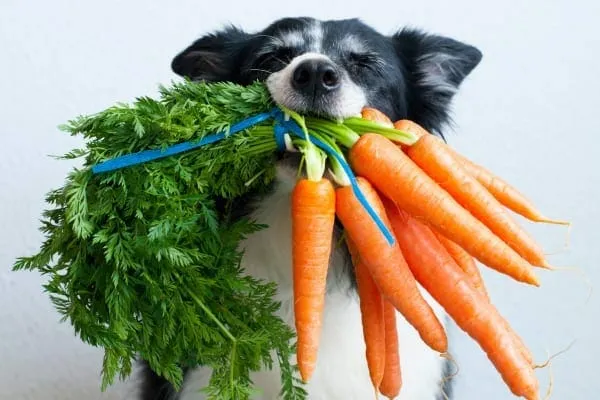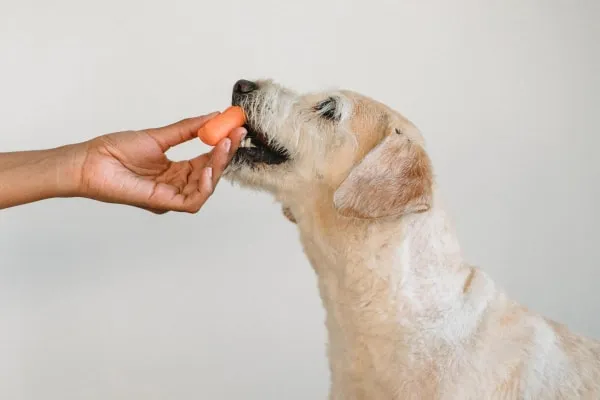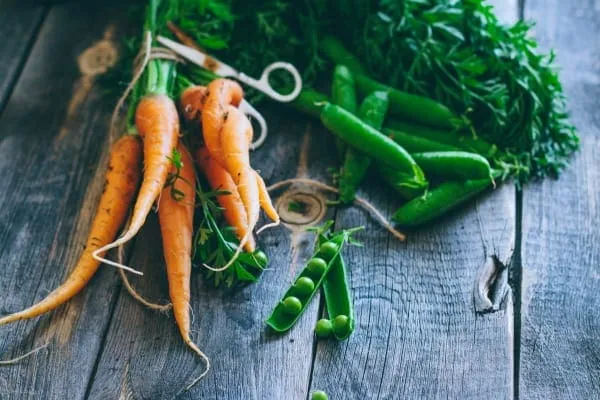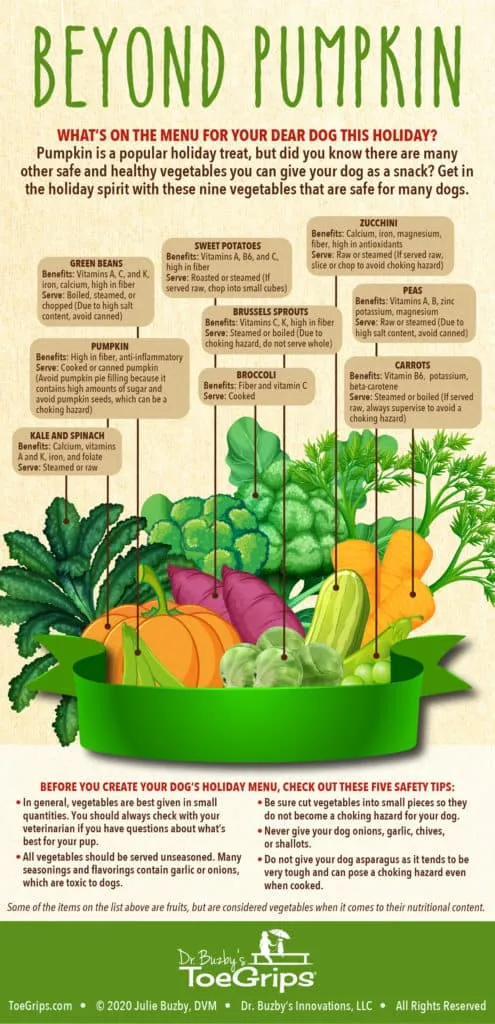As devoted dog parents, we constantly seek ways to enhance our furry companions’ well-being, and that includes their diet. While kibble forms the staple, many owners wonder, “What Is The Best Vegetable For Dogs?” The answer is more nuanced than a single choice, as a variety of vegetables offer unique benefits. Integrative veterinarian Dr. Julie Buzby emphasizes that vegetables are not just safe but can be incredibly nutritious additions to a dog’s diet at any life stage.
When considering vegetables for your dog, it’s essential to understand their potential advantages. These plant-based powerhouses can contribute significantly to your dog’s overall health, acting as more than just a tasty snack.
Benefits of Adding Vegetables to Your Dog’s Diet
Incorporating safe vegetables into your dog’s meals or offering them as treats can yield numerous health benefits. These advantages range from weight management to boosting their immune system.
- Weight Management: For dogs struggling with excess weight, vegetables can be a godsend. They are low in calories and high in fiber, which helps your dog feel fuller for longer. This feeling of satiety can curb overeating and reduce begging. Dr. Buzby often recommends adding a portion of green beans to a dog’s regular meals to help manage hunger while decreasing caloric intake.
- Digestive Health: The fiber content in many vegetables is crucial for a healthy digestive tract. It aids in regular bowel movements, preventing constipation and supporting optimal dog anal gland function.
- Immune Health: Vegetables are packed with essential vitamins and minerals that can bolster your dog’s immune system, helping them ward off illnesses and stay healthy.
- Diabetes Management: For dogs diagnosed with diabetes, certain vegetables can play a role in regulating blood sugar levels. This can be a valuable part of their overall management plan, alongside veterinary guidance and appropriate medication.
- Antioxidant Properties: Many vegetables are rich in antioxidants, which are vital compounds that help combat free radicals in the body. This can reduce the risk of developing certain chronic diseases and promote longevity.
- Training Rewards: Vegetables can serve as excellent, healthy alternatives to traditional store-bought treats during training sessions. The satisfying crunch of some vegetables, like carrots, can be particularly motivating for many dogs.
 A happy dog with a carrot in its mouth, illustrating a healthy vegetable snack.
A happy dog with a carrot in its mouth, illustrating a healthy vegetable snack.
14 Vegetables That Are Safe and Beneficial for Dogs
Navigating the world of human food for dogs can be tricky, as not everything we eat is safe for them. However, a wide array of vegetables are perfectly suitable and even beneficial for canine consumption. Dr. Buzby shares her top 14 picks:
1. Pumpkin
Often lauded as a superfood for dogs, pumpkin (whether technically a fruit or vegetable) is a top choice. Its high fiber content is excellent for regulating digestive issues. It can help thicken stool in cases of diarrhea and promote bowel regularity in constipated dogs. Pumpkin also contains pepita oil, an omega-6 fatty acid that can benefit your dog’s skin. Always opt for plain canned pumpkin, avoiding pumpkin pie filling with added sugars and spices. Introduce it gradually, mixing one to two tablespoons with their regular food. A temporary orange stool color is normal.
2. Broccoli
Broccoli is a nutritional powerhouse, offering fiber and vitamin C for immune support. It can be served cooked without seasonings or in small, raw pieces. While it makes a great low-calorie snack, moderation is key. Excessive consumption can lead to digestive upset and gas. Ensure bite-sized pieces to prevent choking hazards.
3. Carrots
These crunchy delights are a fantastic source of potassium, vitamin B6, and beta-carotene, which converts to vitamin A. Vitamin A is crucial for vision and immune function. Carrots can be served steamed, boiled, or raw. Raw carrots offer a satisfying crunch and are ideal for weight management due to their low calorie count. However, due to their natural sugar content, diabetic dogs should consume carrots sparingly. Always supervise your dog to prevent choking.
 An owner feeding a carrot to her dog, a common and healthy treat.
An owner feeding a carrot to her dog, a common and healthy treat.
4. Green Beans
Green beans are rich in vitamins A, C, and K, as well as minerals like iron and calcium. Their low-calorie, high-fiber profile makes them excellent for diabetic or dieting dogs, promoting a feeling of fullness. They can be served boiled, steamed, or chopped. Avoid seasoned or heavily salted canned versions. Introduce them gradually, ensuring treats do not exceed ten percent of your dog’s daily diet.
5. Kale and Spinach
These dark leafy greens are packed with calcium for bone health, vitamin K for blood clotting, vitamin A for vision, iron for oxygen transport, and folate for nutrient absorption. They can be served raw or steamed without seasonings. While beneficial, too much kale can contribute to urinary problems due to its high calcium content, so serve in moderation and consult your vet if your dog has existing health concerns.
6. Brussels Sprouts
High in fiber, Brussels sprouts also provide vitamins C and K, and magnesium. They are best served steamed or boiled and cut into smaller pieces to prevent choking. Like broccoli, overfeeding can lead to gas and bloating.
7. Zucchini
Zucchini offers calcium, iron, magnesium, and fiber, supporting a healthy digestive system. It can be served raw or steamed. Be extremely cautious of seasonings and dressings, as ingredients like garlic, onions, and xylitol are toxic to dogs. Always check the ingredients to ensure they are safe.
8. Sweet Potatoes
Sweet potatoes are a nutrient-dense, high-fiber vegetable that many dogs enjoy. They are a good source of vitamins A, B6, and C. They can be fed raw (cubed), steamed, or roasted to make them softer and easier to digest. Due to their sugar content, overweight and diabetic dogs should have their intake limited.
9. Peas
Snow peas and sugar peas are a great source of vitamins A and B, potassium, magnesium, and zinc, which supports immune and thyroid function. They can be steamed or boiled. Avoid canned peas with high sodium content. Dogs with urinary incontinence or kidney issues should be cautious due to their purine content.
 A selection of healthy vegetables, including carrots and green beans, laid out for dogs.
A selection of healthy vegetables, including carrots and green beans, laid out for dogs.
10. Corn
Corn is a common ingredient in commercial dog food and provides easily digestible carbohydrates for energy. It also contains linoleic acid, beneficial for skin, coat, and immune health, along with fiber for digestion. However, corn on the cob is a serious choking hazard and should never be given to dogs. Stick to steamed kernels, ensuring no added salt or seasonings.
11. Celery
Low in calories, fat, and cholesterol, celery is another excellent option for dogs on a diet. It should be thoroughly washed and can be fed raw. While not as palatable for all dogs as other options, its crunchy texture is appealing to some.
12. Cooked White Potatoes
Cooked white potatoes are a good source of vitamin C, B6, iron, and magnesium. It is crucial that potatoes are always cooked, as raw potatoes contain solanine, a toxic compound that can cause severe gastrointestinal upset.
13. Cauliflower
Cauliflower is rich in fiber, vitamins K, A, C, beta-carotene, and various minerals. It can be fed raw or cooked, cut into bite-sized florets. Excessive amounts can lead to choking or digestive issues due to its fibrous nature.
14. Beets
Beets are packed with antioxidants, folate, fiber, vitamin C, and essential minerals, benefiting skin and coat health. Don’t be alarmed by a temporary reddish or pink hue in your dog’s urine after consumption; this is normal. Consult your vet if discoloration persists.
Vegetables to Strictly Avoid Feeding Your Dog
While many vegetables are safe, some pose significant risks to your dog’s health. It is crucial to be aware of these and keep them entirely out of your dog’s reach.
1. Onions, Garlic, Chives, and Shallots
These members of the Allium family are toxic to dogs as they can damage red blood cells, potentially leading to anemia. If your dog consumes any of these, contact your veterinarian immediately.
2. Mushrooms
While some mushrooms are safe, many wild and even some cultivated varieties are highly toxic. It’s best to err on the side of caution and avoid all mushrooms to prevent severe illness, including liver and kidney failure.
3. Unripe Tomatoes
Like potatoes, tomatoes are part of the nightshade family. The toxins are most concentrated in unripe fruits and the plant itself. Avoid green tomatoes and tomato leaves or stems.
4. Any Vegetables Posing a Choking Hazard
As repeatedly mentioned, fibrous and hard vegetables should always be prepared appropriately. This includes cutting them into bite-sized pieces and cooking them when necessary. Constant supervision is vital to prevent choking emergencies.
 An infographic detailing healthy vegetables dogs can eat and their benefits, like green beans and carrots.
An infographic detailing healthy vegetables dogs can eat and their benefits, like green beans and carrots.
Preparing Vegetables for Your Dog
The preparation method can significantly impact how your dog digests and enjoys vegetables.
- Raw: Raw vegetables can be convenient and satisfyingly crunchy treats. However, thorough washing is essential to remove dirt, pesticides, and bacteria.
- Steamed: Steaming is a quick and effective method that preserves nutrients while slightly softening the vegetables, making them easier to digest. Ensure they are cooled before serving.
- Boiled: For dogs with dental issues or sensitive mouths, boiled vegetables are the softest option, making them easy to chew. Note that some nutrient loss may occur during boiling.
- Pureed: For picky eaters or older dogs, pureeing vegetables can create an applesauce-like consistency that is easily mixed with their regular food.
- Frozen: Cooked and cooled vegetables can be frozen for a refreshing summer treat.
When introducing any new vegetable, start with a small amount to gauge your dog’s reaction and monitor for any digestive upset. Always remember that while vegetables are a wonderful supplement, they should not constitute your dog’s entire diet. Consult your veterinarian for personalized advice on the best dietary choices for your beloved canine companion.
